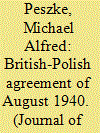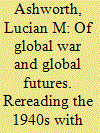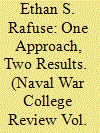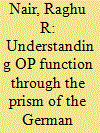| Srl | Item |
| 1 |
ID:
109102


|
|
|
|
|
| Publication |
2011.
|
| Summary/Abstract |
The article discusses the August, 1940 financial and legal arrangement negotiated by the Polish and British Governments regarding the Polish Armed Forces based in the United Kingdom and its possessions. The agreement stipulated that the British Government credits for the Polish military, as well as for the support of the Polish diplomatic and civilian personnel, would be based on the escrow of the Polish Gold evacuated from Poland and to be repaid after the war. The legal and financial agreements that were signed in August 1940, and modified throughout the war, document that the Polish Armed Forces were a sovereign military under the constitutional control of the Polish Government in exile. This historical fact has been eroded by time and the consequences to the Polish cause of the outcome of the war. This article attempts to address the mythologies that have spawned, about the Polish Forces, often well meaning but erroneous nonetheless. The article concludes with a summary of the final auditing of expenses in 1946 when the Polish Gold was returned to a communist dominated Poland.
|
|
|
|
|
|
|
|
|
|
|
|
|
|
|
|
| 2 |
ID:
174069


|
|
|
|
|
| Summary/Abstract |
Not very far from where I live in St. John’s there is a place called Placentia Bay. It is in this bay on August 1941 that the British Prime Minister Winston Churchill and the US President Franklin Delano Roosevelt met. Although the United States was still formally neutral (and the Soviet Union was not represented, although along with other Allied powers it later agreed to the principles), it was on the rendezvousing warships that the two leaders and their aides came up with a set of Allied war aims that would come to be known as the Atlantic Charter. While historians still debate the Charter’s role in the development of Allied war aims, its symbolic role in post-war reconstruction underscore the importance of the ‘trans-war’ period of the 1930s and 1940s for the development of the modern world.
|
|
|
|
|
|
|
|
|
|
|
|
|
|
|
|
| 3 |
ID:
181966


|
|
|
|
|
| Summary/Abstract |
The French army’s 1940 campaign was disastrous, whereas the U.S. Marine Corps cracked the problem of making an opposed amphibious landing, keying victory over imperial Japan. But despite these military organizations’ different approaches, a closer examination reveals that the two services shared more in common in the problems they faced and the answers they developed than their operational results suggest.
|
|
|
|
|
|
|
|
|
|
|
|
|
|
|
|
| 4 |
ID:
172742


|
|
|